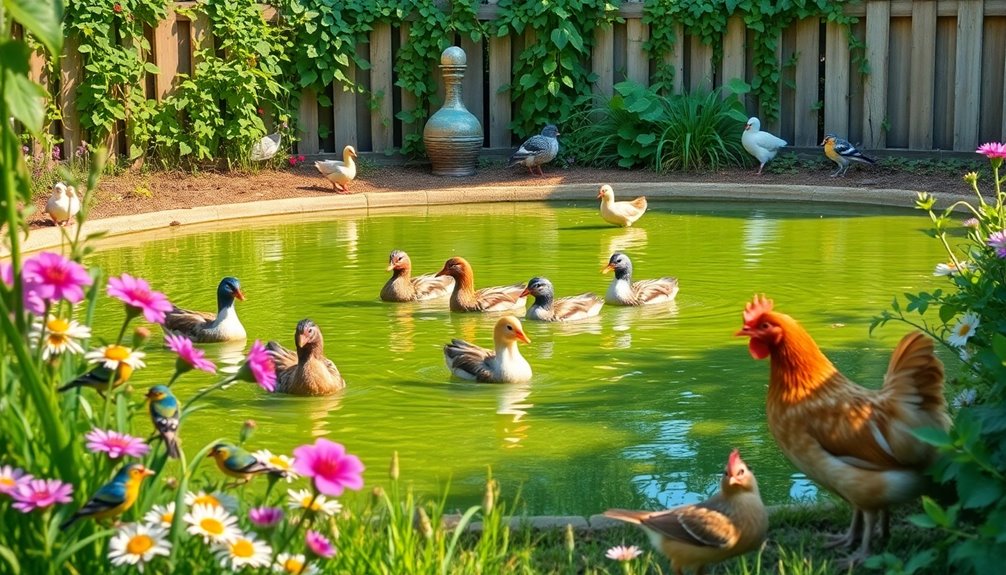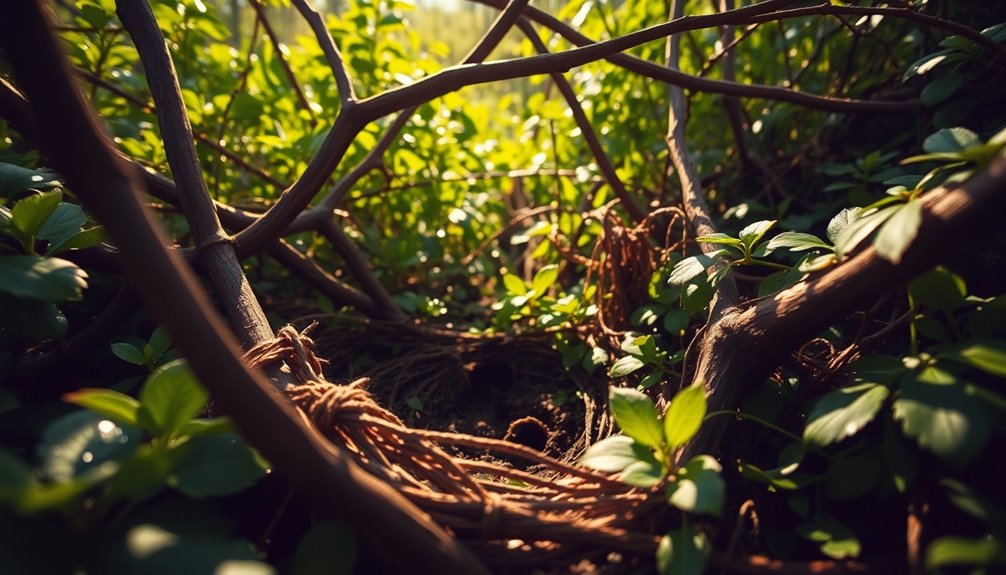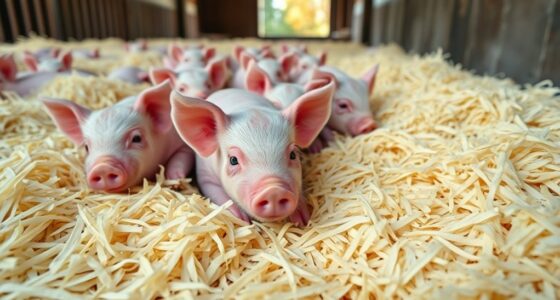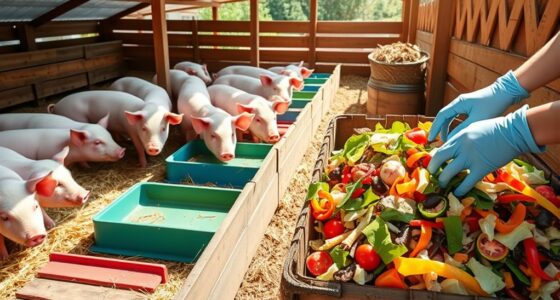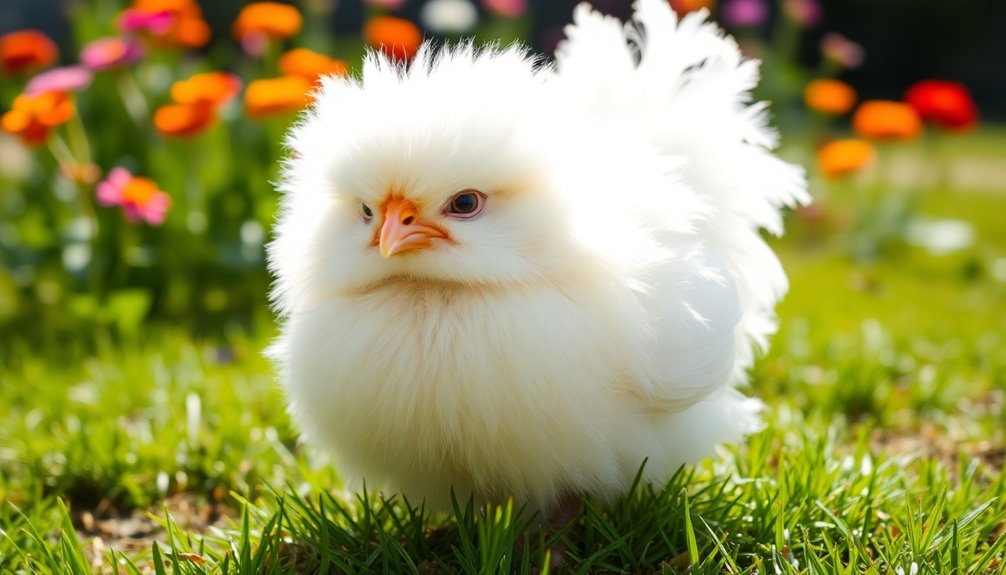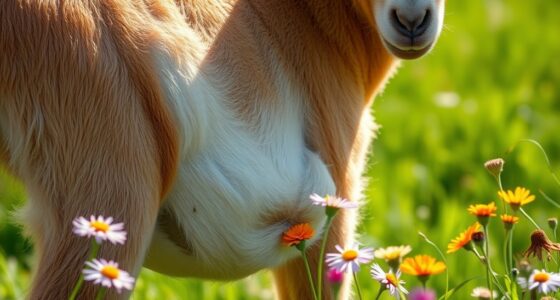Ducks can certainly live with other birds and often enjoy the company. They're less aggressive than some birds, like chickens, which helps reduce conflict in mixed flocks. You can keep them with chickens, pigeons, geese, and even quail, as long as you provide separate feeding and nesting areas. Make sure to give each bird enough space—about 10 square feet each is ideal. However, you'll need to monitor their interactions closely to prevent any issues. With the right setup and care, your backyard can become a thriving environment for all your feathered friends. You'll discover more essential tips soon.
Key Takeaways
- Ducks can coexist with chickens, pigeons, geese, quail, and larger parakeets, but require separate feeding and nesting areas.
- Ducks are less hierarchical than chickens, resulting in reduced aggression in mixed flocks.
- Ensure at least 10 square feet of space per duck to minimize stress and promote harmony.
- Regular health checks and distinct water sources are essential to prevent disease transmission among birds.
- Gradual introductions of new birds, along with monitoring behavior, can help establish compatible flock dynamics.
Understanding Duck Behavior
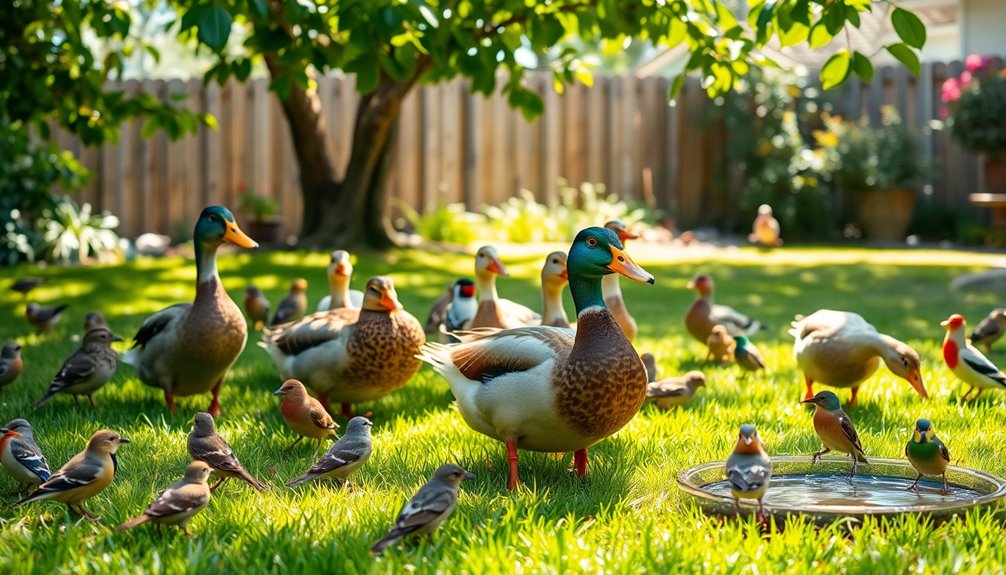
When it comes to understanding duck behavior, you'll notice they thrive in social environments, often getting along with other bird species without much fuss.
Ducks are less hierarchical than chickens, which means they don't engage in the pecking order dynamics that can create tension in mixed flocks. This trait makes them more compatible with other birds, as they tend to form neutral relationships without showing aggression.
However, keep an eye on individual temperaments, as some ducks may be more social than others.
Ideal Living Conditions
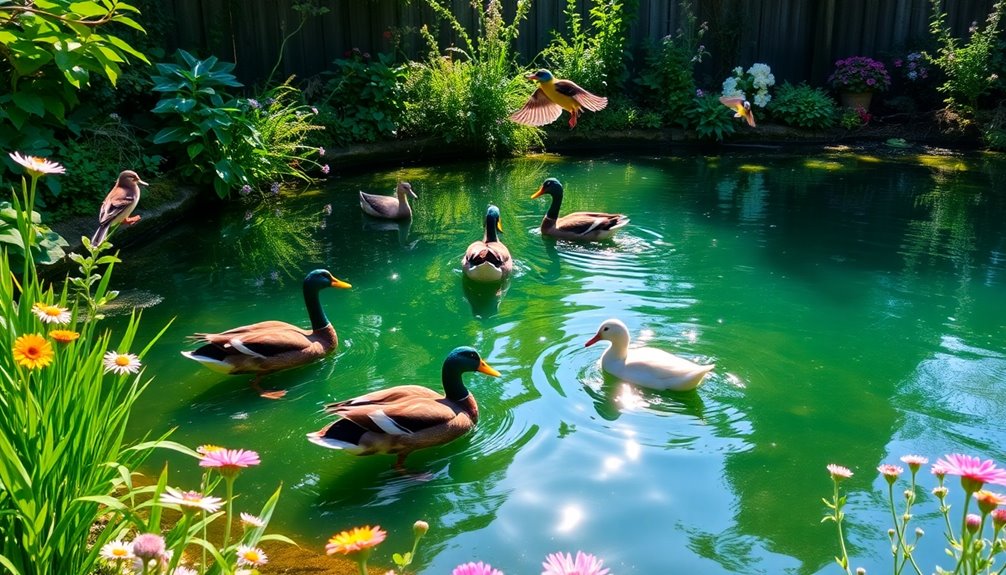
Creating ideal living conditions for your ducks and other birds is vital for their health and happiness.
Ducks and chickens require adequate space to thrive, with at least 10 square feet per bird to reduce stress. Your housing should protect them from predators and offer good ventilation to prevent humidity buildup.
It's important to set up separate feeding and watering stations since ducks are messier eaters and need water for swimming, while chickens prefer to stay dry.
Daily cleaning of bedding is necessary to maintain hygiene, as ducks produce more waste, which can lead to health issues for all birds.
Finally, monitor individual temperaments during introductions to guarantee compatibility and minimize aggression in your mixed flock.
Space Requirements for Cohabitation
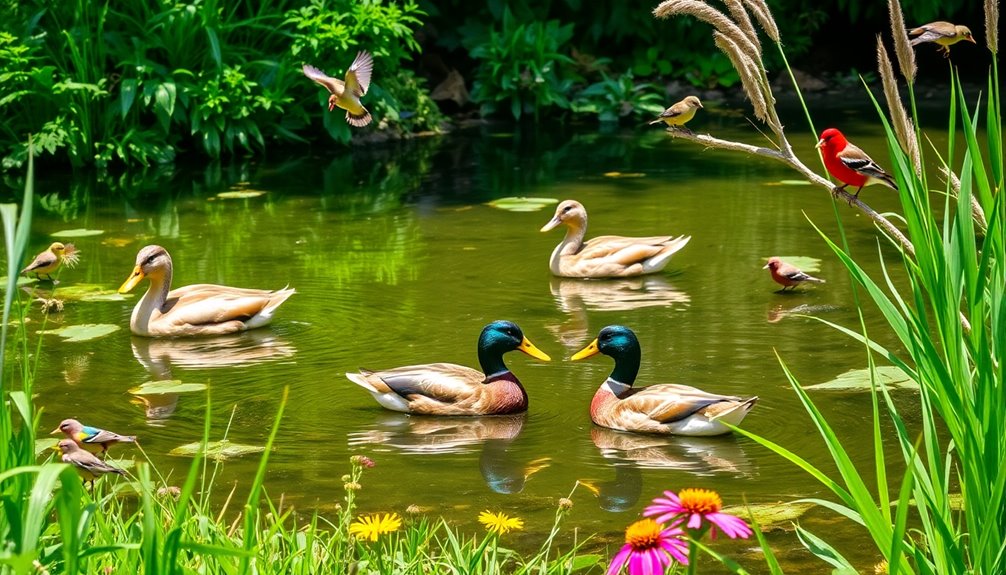
Adequate space is vital for the harmonious cohabitation of ducks and other birds. To keep them healthy and reduce stress, aim for at least 10 square feet per bird. Ducks typically need more space than chickens due to their size and activity levels, so careful planning is significant.
Consider these factors:
- Separate feeding and nesting areas to minimize competition.
- Ground-level entrances for ducks, avoiding steep ramps.
- Regularly monitor flock dynamics to address any conflicts.
- Provide plenty of room to guarantee all birds feel comfortable and secure.
- Design shelters thoughtfully to keep them dry and protected.
Dietary Needs and Feeding

When you're caring for both ducks and pigeons, you'll need to understand their unique dietary needs.
Ducks thrive on waterfowl feed and greens, while pigeons prefer seeds and grains, so managing separate feeding stations is crucial.
This way, you can guarantee each bird gets the right nutrition without any competition or health issues.
Species-Specific Nutritional Requirements
Understanding the species-specific nutritional requirements of ducks and other birds is essential for their health and well-being. Ducks require a diet rich in waterfowl feed, greens, and extra niacin, often supplemented with brewer's yeast.
In contrast, pigeons thrive on seeds and grains tailored to their needs. Here are some important points to reflect on:
- Ducks enjoy a high-water content diet.
- Cross-contamination of feed can lead to health issues.
- Separate feeding stations prevent competition for food.
- Monitor food intake closely, especially for growing ducklings.
- Provide appropriate water sources to minimize feed contamination.
Feeding Station Management
Managing feeding stations effectively is key to ensuring that ducks and other birds receive the right nutrition without competing for resources. Ducks need a diet high in waterfowl feed and greens, while pigeons thrive on seeds and grains.
To avoid dietary conflicts, set up separate feeding stations for each species. This prevents cross-contamination of feed, which can lead to health issues. Ducks also require higher niacin levels, so consider supplementing their diet with brewer's yeast.
Regularly monitor food intake, as ducks can be messier eaters, potentially wasting food and creating hygiene problems. By providing distinct feeding areas, each bird can self-regulate their intake, ensuring they maintain a balanced diet without competition. Additionally, understanding nutritional considerations for cats can help inform the best practices for managing feeding stations for various animals.
Health Risks and Disease Prevention
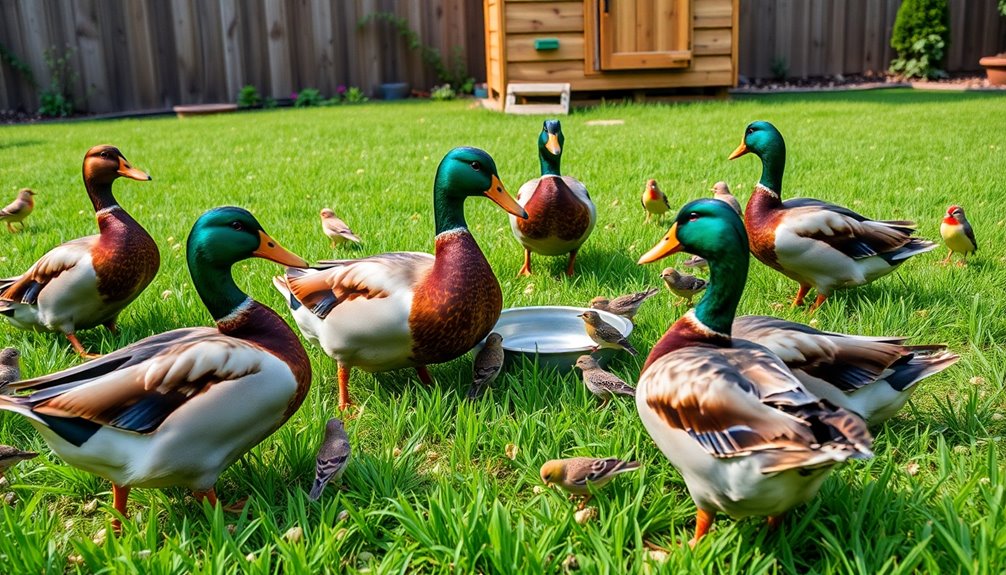
When keeping ducks alongside other birds, you need to be aware of disease transmission risks that can affect the entire flock.
Regular health checks and proper sanitation measures are vital to prevent outbreaks and guarantee each bird stays healthy.
Monitoring their interactions will help you identify potential issues early and keep your avian companions safe.
Disease Transmission Risks
Maintaining the health of your mixed bird flock is essential, as ducks can carry diseases like avian influenza and salmonella that threaten other birds.
To minimize disease transmission risks, you should implement the following strategies:
- Conduct regular health checks for all birds to catch illnesses early.
- Provide separate water sources for ducks and other species to prevent cross-contamination.
- Monitor wet conditions caused by duck waste, which can lead to respiratory issues in sensitive birds.
- Guarantee adequate space to reduce stress and lower the chance of weakened immune systems.
- Observe flock interactions closely to identify any aggressive or incompatible behaviors.
Preventative Health Measures
Preventative health measures are essential for guaranteeing the well-being of your mixed bird flock. To keep your ducks and other birds healthy, you should monitor health closely and perform regular health checks. Here's a quick guide to help you:
| Preventative Measure | Purpose |
|---|---|
| Separate feeding/watering stations | Prevent cross-contamination |
| Regular cleaning of bedding | Reduce disease risk |
| Proper drainage | Prevent respiratory issues |
| Health monitoring | Early illness detection |
| Routine health checks | Guarantee timely intervention |
Monitoring Bird Interactions
Monitoring your birds' interactions is essential for preventing health risks and guaranteeing a harmonious environment. Ducks can carry diseases that may impact other birds, so you must be vigilant.
Here are key considerations for maintaining health and safety:
- Always monitor health closely for any signs of illness.
- Provide adequate space to minimize stress and aggression.
- Guarantee regular cleaning to prevent respiratory issues from wet conditions.
- Set up separate feeding stations to reduce competition and overcrowding.
- Conduct regular health checks for both ducks and other birds.
Additionally, keeping an eye on signs of illness can help ensure that any potential health issues are addressed promptly, safeguarding the well-being of all your birds.
Monitoring Social Interactions
Observing social interactions among ducks and other birds is vital for keeping peace in your flock. Monitoring social interactions helps you identify any signs of aggression or territorial behavior, especially as ducks may react strongly to smaller or younger birds.
Regularly watching flock dynamics can reveal stress signals, allowing you to step in promptly to maintain harmony. Adequate space is essential; it minimizes competition and reduces conflict likelihood.
Remember, individual temperaments vary—some ducks will coexist peacefully with other species, while others might need to be separated. When introducing new birds, create a gradual process with close supervision to assess compatibility and reduce aggressive encounters. Additionally, understanding individual temperaments can aid in fostering a cohesive environment among diverse bird species.
This proactive approach guarantees a balanced and enjoyable environment for all your feathered friends.
Suitable Bird Companions
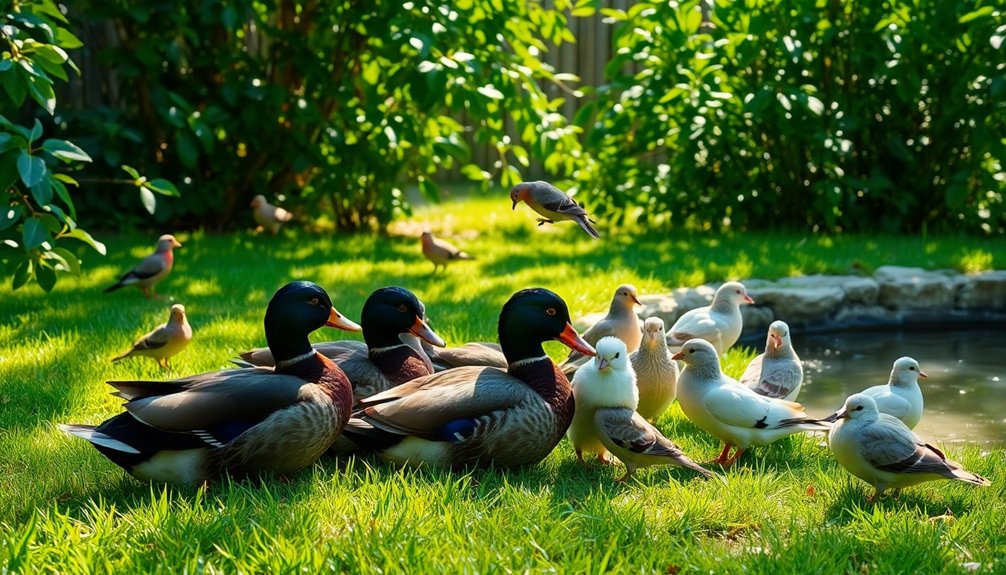
Finding suitable bird companions for your ducks can enhance the harmony of your flock and create a vibrant environment.
Ducks love to socialize, but compatibility depends on individual temperaments and space availability. Here are some compatible bird companions to evaluate:
- Flock of chickens: They can coexist, but make sure that the area has separate feeding and nesting spots to reduce competition.
- Pigeons: Generally neutral, they can share space with ducks without much conflict.
- Geese: They often get along, provided there's enough room to roam.
- Quail: Small and gentle, they usually don't provoke aggression.
- Larger parakeets: They can be friendly, but monitor interactions closely.
Introducing New Birds
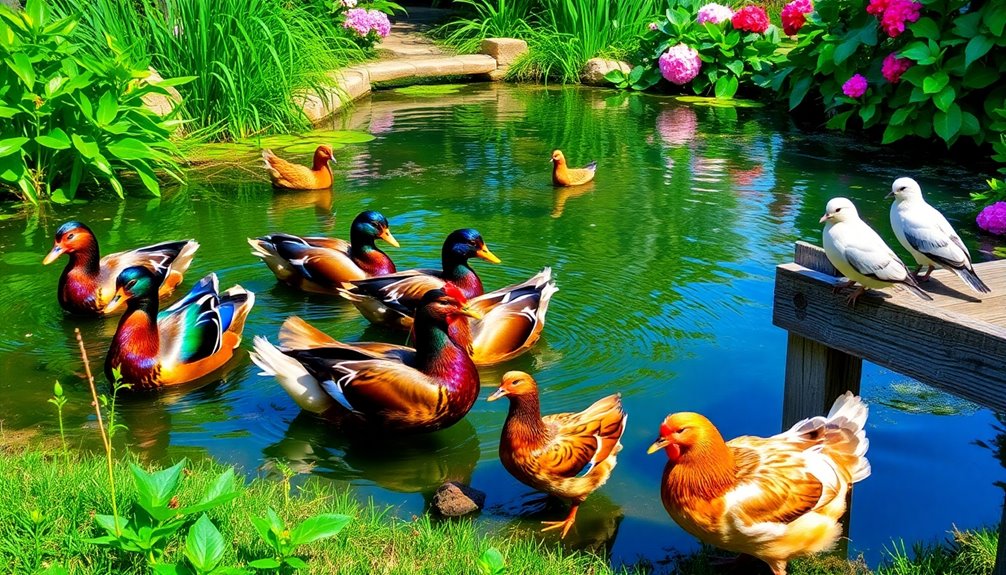
Introducing new birds to your flock can be a delicate process, and it's essential to approach it with care.
Start by quarantining the newcomers for at least two weeks to prevent any potential disease spread. When you're ready to introduce them, do so gradually, allowing all birds to become familiar with each other's presence without direct contact.
Make sure there's ample space to reduce territorial disputes. Monitoring behavior closely during this time is important; watch for signs of aggression or stress that may require intervention.
Additionally, providing separate feeding and nesting areas will help alleviate competition for resources, making the shift smoother for everyone.
Environmental Enrichment Strategies
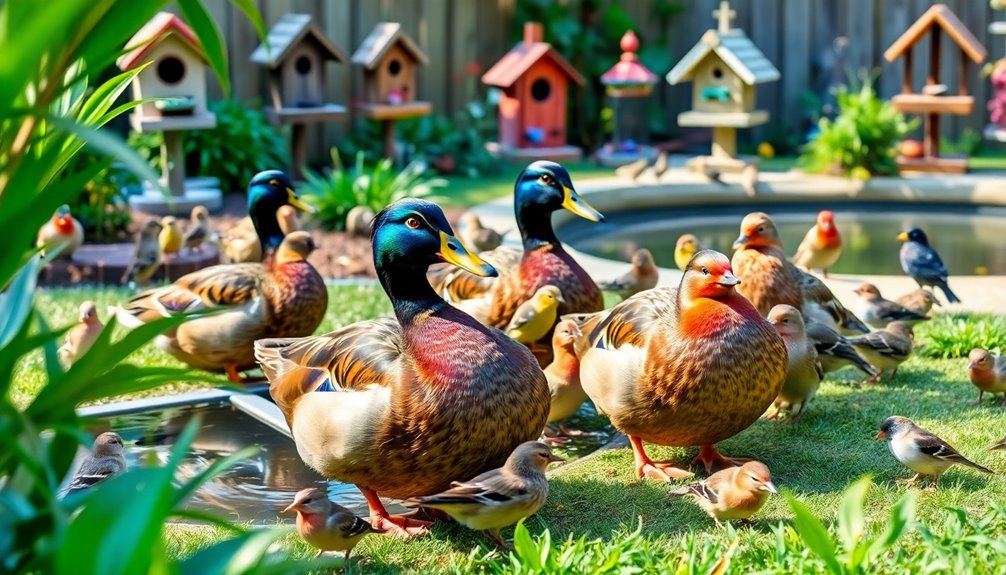
To keep your ducks happy and healthy, consider incorporating natural foraging opportunities into their environment.
Scatter grains or vegetables around their space to encourage scavenging, which mimics their wild behavior.
Additionally, adding interactive toys and activities can stimulate their curiosity and promote physical engagement, enhancing their overall well-being.
Natural Foraging Opportunities
Natural foraging opportunities are essential for ducks, as they help mimic their natural behaviors and enhance their overall well-being.
By providing an environment that encourages foraging, you can improve your ducks' health and happiness.
Consider implementing these strategies:
- Create designated foraging areas with shallow ponds, mud, and grassy patches.
- Offer a variety of foraging materials like leafy greens, grains, and kitchen scraps to boost dietary diversity.
- Incorporate enrichment tools, such as treat balls or scattered feed, to stimulate exploration.
- Regularly rotate foraging locations to prevent overgrazing and promote new vegetation growth.
- Guarantee chickens have access to different foraging spots to keep both species engaged and reduce competition.
Interactive Toys and Activities
Enhancing your ducks' environment with interactive toys and activities can greatly boost their well-being and engagement.
Consider providing interactive toys like floating balls or mirrors that stimulate their curiosity and encourage natural foraging behaviors. Create foraging areas with hidden treats, such as vegetables or grains, to promote mental engagement and mimic their instinct to search for food.
Incorporating water features, like kiddie pools or shallow tubs, allows ducks to swim and bathe, enhancing both their physical and mental health. Offering various textures, such as sand or gravel, in designated digging areas satisfies their instinct to explore.
Regularly rotating toys and activities keeps boredom at bay, ensuring a happier, more engaged flock dynamic. Additionally, providing toys that promote cognitive growth can further enhance their playtime experience and overall development.
Best Practices for Coexistence
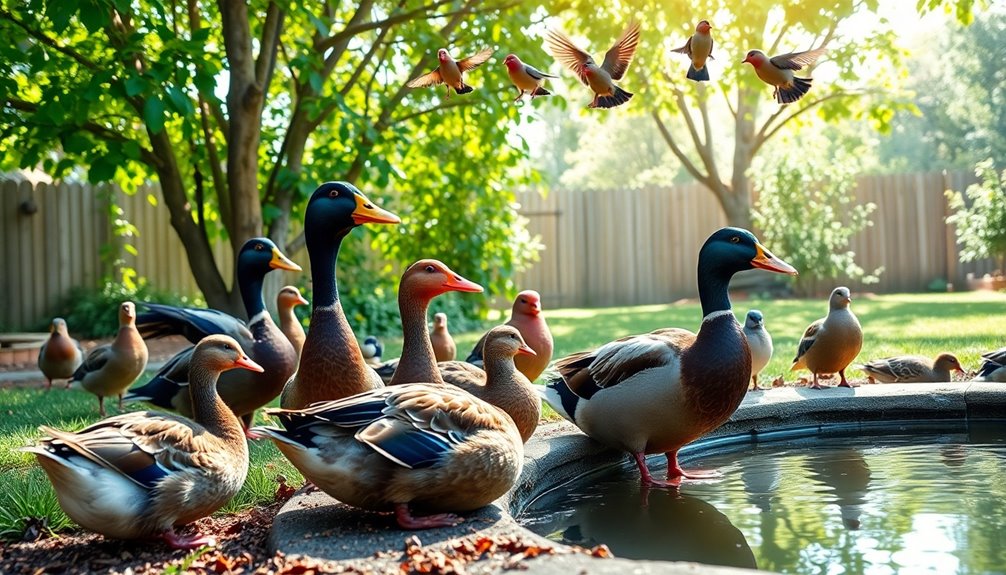
Creating a harmonious environment for ducks and chickens requires careful planning and attention to their unique needs.
To guarantee a peaceful coexistence, follow these best practices:
- Provide separate feeding stations to accommodate different eating habits.
- Guarantee at least 10 square feet of living space per bird to minimize stress.
- Monitor their behavior closely during introductions to gauge compatibility.
- Manage water resources effectively, giving ducks access to water while keeping areas dry for chickens.
- Perform regular health checks to spot any signs of illness or stress.
Frequently Asked Questions
What Birds Can You Keep With Ducks?
If you're considering what birds to keep with ducks, you've got some great options.
Chickens and ducks usually get along well, letting both maintain their space. Quail can coexist too, as long as you provide separate feeding areas.
Geese often share similar needs with ducks, making them compatible.
Just avoid larger birds like turkeys or guineafowl, since they might bully your ducks.
Always monitor their interactions for a peaceful environment.
What Is a Good Companion for a Duck?
So, you think ducks need a social life? Well, they do!
Chickens make great companions for your quacking pals. They've got different social structures, so ducks won't have to worry about a pecking order.
Just make sure they've got enough space and separate feeding stations, or you might witness a dinner brawl.
Keep an eye on them, and you'll have a harmonious backyard flock, proving that even ducks need a buddy or two!
Do Ducks Mourn the Loss of Another Duck?
Yes, ducks do mourn the loss of another duck.
You might notice them calling out for their lost companion or showing signs of decreased activity. They often withdraw from the flock, search for the deceased, and may even become less interested in food and water.
To help a grieving duck, providing companionship with other ducks or birds can ease their stress and support their emotional well-being during this difficult time.
Can Ducks Live Without Other Ducks?
Imagine a lone duck, drifting like a solitary leaf on a vast pond.
Ducks can live without other ducks, but they thrive in companionship. If you keep a single duck, it'll need your attention and interaction to avoid loneliness.
While they can adapt to mixed flocks with other birds, be aware of their need for space and social stimulation.
With care, your solitary duck can flourish, even without its own kind nearby.
Conclusion
To sum up, while ducks can thrive alongside other birds, their compatibility largely hinges on individual personalities and proper management. Some folks believe ducks are too messy for mixed flocks, but with adequate space and careful attention to their needs, you can create a harmonious backyard environment. By ensuring compatible companions and fostering a balanced ecosystem, you can enjoy the unique charm of ducks and other birds cohabitating peacefully. So, give it a try and see how they get along!

